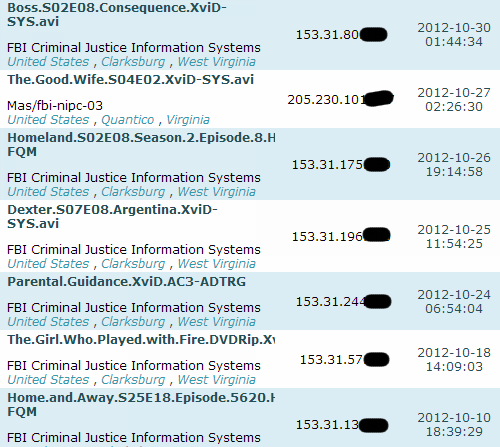BitTorrent Files Found On FBI Computers, New Report Questions Possible Hypocritical Law Enforcement Methods

Busted? Just as the FBI has been increasing pressure on Internet users who illegally download music and movies, a new report found evidence of pirated content on computers at the bureau’s Criminal Justice Information Services Division.
However, it remains unknown whether the content was obtained as part of an undercover sting investigation or if FBI employees were illegally downloading pirated content for their own use.
How It Works
BitTorrent Inc. is one of the most powerful companies in the world of Internet piracy, mostly because it’s the umbrella company of the uTorrent client program that more than a hundred million people use to download files.
When someone downloads a torrent file, they "rip" it from a number of "seeders," who "link" to the downloader’s IP address. If someone is saving a popular movie to their computer, they may be linked to dozens or even hundreds of other people who are trying to download or seed the same file. While the process occurs, each individual’s IP address is often exposed to the other computers they’re linked to.
The risk for BitTorrent customers enters the equation when law enforcement officials and copyright enforcers want to track a download, thereby joining the downloaders/seeders who make up the "swarm." This type of online-undercover investigation has been used to catch Internet pirates, and it has even helped bring down some major torrent sites.
The FBI And BitTorrent
TorrentFreak published a screen shot on Saturday of FBI IP addresses that were part of seven swarms. It’s unknown if the agency is holding a sting operation or if agency employees are using FBI computers to save such content as episodes of “Homeland,” “The Good Wife,” “Dexter,” or “The Girl Who Played With Fire” via BitTorrent.
If that’s the case, the FBI employees would hardly be alone in getting busted. TorrentFreak has previously caught employees at record labels, major movie studios, the Department of Justice and congressional staffers downloading content illegally.
The highest profile copyright case involving the FBI was the 2012 raid on the New Zealand home of Megaupload founder Kim Dotcom.
An upcoming “six-strike” program represents the latest strategy in the fight against online piracy, which has been a long and difficult one for content owners. If the FBI does have employees downloading media illegally, it could come to symbolize the enforcement methods that have been used so far, not to mention what some view as the hypocrisy behind the bureau’s explanation of intellectual property theft on its website.
“It’s a growing threat -- especially with the rise of digital technologies and Internet file sharing networks,” the statement reads. “And much of the theft takes place overseas, where laws are often lax and enforcement more difficult. All told, intellectual property theft costs U.S. businesses billions of dollars a year and robs the nation of jobs and tax revenues.
“Preventing intellectual property theft is a top priority of the FBI’s cyber program.”
© Copyright IBTimes 2025. All rights reserved.





















